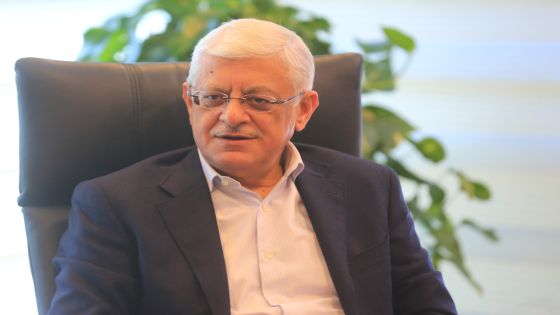
By : Nedal Zubeidi
Jordan Daily – Inside the modern headquarters of Capital Bank, one of Jordan’s leading financial institutions, Bassem Khalil Al-Salem, the bank’s Chairman, radiates a sense of calm authority.
For nearly two decades, Al-Salem has been steering Capital Bank through the complex financial landscape of the Middle East, positioning it as a key player not just in Jordan, but regionally, particularly in Iraq. With a career marked by stints as Jordan’s Minister of Finance and Minister of Labor, Al-Salem’s vision has been instrumental in guiding the bank’s response to the ever-evolving demands of the 21st-century market.
Al-Salem, an engineer by training and one of the bank’s founders, has chaired Capital Bank’s board since 2011. His leadership, grounded in a forward-thinking yet pragmatic approach, has helped turn the bank into a robust financial institution, poised to meet the increasing infrastructure and development needs of Jordan and its neighbors.
In a region known for its volatility, the Capital Bank Group – which includes Capital Bank, the National Bank of Iraq, and Capital Investments – has not only weathered storms but thrived. As of 2024, the group boasts assets of approximately 8.2 billion Jordanian dinars , with shareholders’ equity reaching 744 million dinars. These numbers reflect steady growth, underscored by strong financial results through the first nine months of 2024. The bank reported a net profit of JD110 million , a 34% increase from the previous year.
Al-Salem attributes this success to a clear and disciplined strategy. “The remarkable performance we’ve seen over the past months is a direct result of our carefully crafted approach,” he said in recent remarks. “We are focused on financial sustainability and expanding our footprint in the region. Our efforts to diversify our client base and offer innovative banking solutions have paid off.”
Capital Bank has positioned itself as a key player in the regional banking landscape, particularly in Jordan and Iraq, where economic recovery and growth are intertwined with large-scale infrastructure development. The bank’s ability to cater to the financing needs of these projects has been pivotal in its regional expansion strategy.
Jordanian banks, according to Al-Salem, are well-capitalized to meet the demands of such projects. “With an asset base representing over 175% of the country’s GDP, Jordan’s banking sector is fully equipped to handle the financing needs of local large-scale infrastructure projects,” Al-Salem noted. “We’ve seen major international financial institutions, including the European Bank for Reconstruction and Development (EBRD), Proparco, and the International Finance Corporation (IFC), partnering with local banks and investors to finance critical infrastructure.”
Al-Salem’s tenure at Capital Bank is the latest chapter in a distinguished career that includes transformative roles in government. As Jordan’s Minister of Finance , Al-Salem was known for his austerity measures, which reined in public spending and tightened fiscal policies. His tenure was marked by a strong emphasis on controlling and reducing governmental expenditures, bringing much-needed discipline to the country’s finances. “My goal was to restore a sense of sanctity to the state’s finances,” he reflected. “We needed to ensure that the resources of the public were being used efficiently and with purpose.”

Before taking the reins of the finance ministry, Al-Salem served as Minister of Labor, where he helped create policies that stimulated job growth in both the public and private sectors, while also making Jordan more attractive to foreign investors. His efforts during this time laid the groundwork for many of the economic policies that have helped Jordan weather subsequent global economic downturns.
Today, in addition to his role at Capital Bank, Al-Salem chairs the Association of Banks in Jordan, further solidifying his influence on the country’s financial policies. His leadership extends beyond the banking sector, as he also serves on the boards of several prominent public and private companies.
The son of renowned economist Khalil Al-Salem, who was a key figure in establishing the Central Bank of Jordan, Bassem Al-Salem grew up steeped in the world of finance. After earning a degree in chemical engineering from Imperial College London, he returned to Jordan, where he founded several industrial companies before transitioning to public service and later to banking.
Under his leadership, Capital Bank has not only grown in size but also expanded its range of services, offering integrated solutions for both individual and corporate clients. The bank’s foray into the Iraqi market has been particularly successful, helping to finance projects that are critical to Iraq’s reconstruction efforts.
As the region continues to face political and economic challenges, Al-Salem remains optimistic about the future. “We’ve taken calculated steps to ensure that we are not just growing, but growing in a way that’s sustainable,” he said. “There is tremendous opportunity in the Middle East, and we intend to be at the forefront of providing the financial solutions needed to seize these opportunities.”
For now, Bassem Al-Salem continues to lead Capital Bank on a steady course, grounded in a deep understanding of both local and regional dynamics. In a part of the world where unpredictability is the norm, his strategic vision and measured approach have proven to be invaluable assets for both his bank and his country.

